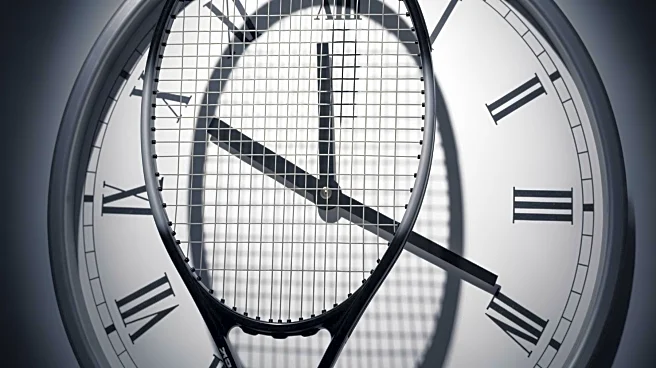What's Happening?
Ons Jabeur, a prominent tennis player, has publicly shared her struggles with depression, attributing it to the demanding nature of the tennis schedule. Jabeur has called for a reevaluation of the Masters
1000 tournaments, which are currently played over two weeks, suggesting that the extended duration is detrimental to players' mental and physical health. She announced a break from the sport to focus on her wellbeing, highlighting the need for the tennis community to listen to players' concerns about the schedule. Jabeur's comments come after her retirement from Wimbledon due to breathing difficulties, and she has since launched a foundation and academy in Dubai.
Why It's Important?
Jabeur's revelations underscore the growing concerns about the mental health of athletes in professional sports. Her call for schedule reform could prompt tennis authorities to reconsider the structure of tournaments, potentially leading to changes that prioritize players' health. This issue is significant as it affects not only the athletes but also the broader tennis community, including sponsors and fans. The potential reform could lead to a more sustainable career path for players, reducing burnout and injuries, and ensuring the longevity of athletes' careers.
What's Next?
The Women's Tennis Association (WTA) has been contacted for a statement regarding Jabeur's comments, indicating that discussions may be underway about potential changes to the tournament schedule. If the tennis authorities take action, it could lead to a restructuring of the calendar, possibly reducing the length of tournaments or the number of consecutive events. This could also spark broader conversations about athlete welfare in other sports, encouraging similar reforms.
Beyond the Headlines
Jabeur's situation highlights the ethical considerations of athlete welfare, emphasizing the need for sports organizations to balance commercial interests with the health of their players. The cultural shift towards prioritizing mental health in sports could lead to long-term changes in how athletes are supported, both on and off the field. This development may also influence public perceptions of professional sports, encouraging fans to advocate for healthier conditions for athletes.









